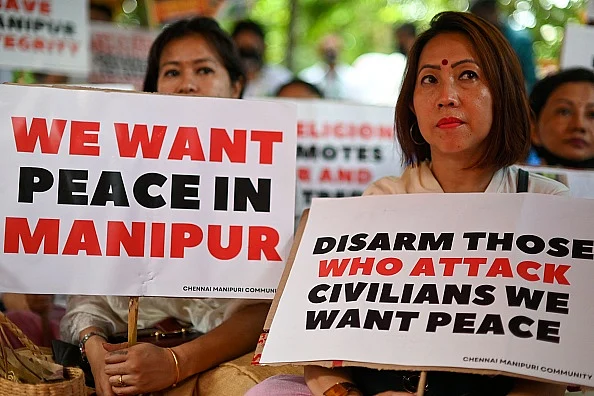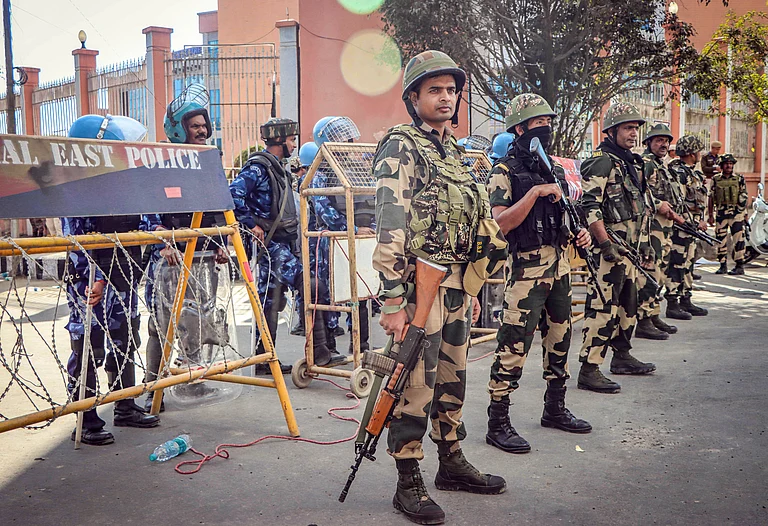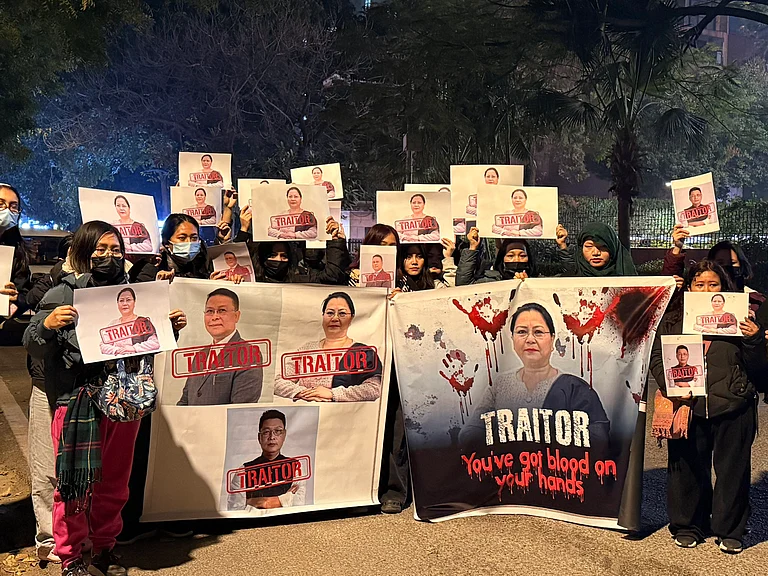(Manipur CM Biren Singh has resigned after continuing violence in the state for almost two years. In this context, we revisit an article published earlier that explains the various fault lines in the state that cause the frequent flare ups.)
The violence that erupted in Manipur on May 3, 2023 was not a result of any historical fault lines. The real reason was the way political developments were shaping up in the last 6-7 years. A series of events—like the announcement of administrative policies, strengthening of underground armed organisations, increasing influence of extremism and right-wing forums on non-tribal communities, economic policies of the central government, pandemic and lockdown, the establishment of undemocratic administration in Myanmar, etc.—were responsible for the violence that has not abated till date.
During this period, mutual trust and cooperation among communities was continuously diminishing because the government and the administration were not being impartial and neutral. Similarly, the growing knot and tie between politicians-bureaucracy-vested interest-based organisations and the increasing influence of money, drugs and weapons in electoral politics were also important factors that led to the May 3 mayhem in Manipur. Tribal communities impose economic blockades in their respective areas to put pressure on the government and administration on the issue of inner line permits and against the Imphal High Court's decision on Meitei Tribal Union’s written petition of ST reservation. Imphal Valley residents, mostly the Meitei community, are victims of Kuki's highway blockading. The sufferings of Meitei people and their distrust and resentment towards tribal communities increased.
A Series of Fault lines in the State
These fault lines starting appearing with the Naga Peace Accord of 2015 when the Centre did not take the opinion of the Manipur government and the Naga community of the state into confidence on the Naga issue. After this, the Congress government in the state formed seven new districts in 2016, even though Naga organisations opposed the formation of these new districts. The Naga community did not accept this political-administrative decision of the state government. The Naga area was divided by the creation of Kangpokpi as a new district from the Naga-dominated Sadar district.
“The Naga community blocked the highways in anger against the government's decision, while the Meitei community celebrated it with joy,” says Kangpokpi journalist Kamboi. The Naga and Kuki communities considered the formation of these new districts against their interests. The tribal communities voted against the government in the 2017 Assembly Elections, due to which the then-ruling party lost most of the assembly seats in the hill region. In fact, for the last few years in the state, political parties have been winning elections by using the strategy of divide and rule between the tribal community and the non-tribal community.
GST and Demonetisation Policies
The GST and demonetisation policies of the Central government badly affected the economic livelihood of the tribal communities in the state. Due to these policies, the tribal communities became more dependent on the capital (Imphal) and Imphal became more dependent on New Delhi. These communities depend more on traditional systems of market and trade such as cash currency, slip system and barter system.
Boynao, a government employee, says: “Most families in the tribal community depend on hard cash because there are no banking facilities in the villages in the hilly areas and banks’ cheques are meaningless for them, so they refuse to accept cheques.”
Due to demonetisation, business activities in the hilly areas of the state were stopped for several months, due to which unemployment and inflation increased. Due to these new policies, no new private investment came in the hilly areas of the state; moreover, the government's expenditure also decreased. These policies have created such circumstances for the hill communities to take up new farming (drugs farming) for employment and livelihood. This new cultivation is known as narcotic substances like the illegal cultivation of poppy crops. Tribal communities adopted this new farming out of compulsion and willingness. This new farming may be illegal and unethical in the eyes of the government, administration and religious institutions, but in the community, it is considered risky farming adopted due to a lack of alternatives.
Pandemic and Lockdown
The pandemic and the nationwide lockdown have also acted as a fault line for May 3 in Manipur. The lockdown was imposed twice across the country. It was implemented more effectively and for a long time in the hilly areas of the state. Due to the lockdown across the country, thousands of people had returned to their loved ones in the state. The government had not made any effective arrangements for employment and livelihood for the people who returned to homes in the hilly areas.
The communities in the hilly areas had already not recovered from the negative impact of the GST and demonetisation when the lockdown further complicated the situation. Corona lockdown further increased unemployment in the hilly areas of the state. Traditional women-centric market systems like Ima Keithal were destroyed.
When the situation became normal after the lockdown ended, several thousand people from the state did not migrate. Neither the state government nor the central government took any effective measures to generate jobs and livelihood for the people who did not return. Due to unemployment, people immediately started using whatever means and methods seemed appropriate for their livelihood. P Lupheng says: “The economic blockade of All Tribal Student Union of Manipur (ATSUM) and the lockdown has devastated the economy of the hilly areas of Manipur, almost beyond recovery.” Jobless and distressed people, especially lockdown returnees, have started selling illegal substances and illegal cultivation in the hilly areas of the state. The tribal people cannot grow paddy on their hills. The governments also neither encouraged horticulture nor created any decent livelihood opportunities in the hilly areas.
The Myanmar Connection
On February 2, 2021, the return of military rule in Myanmar was also considered a cross-border cause of the 3rd mayhem in Manipur. The fighting between the military regime and armed groups of anti-military tribal communities in Myanmar's Chin state, which borders the Manipur-Mizoram border, has forced thousands of people to flee to India.
People from the same ethnic community live on both sides of the border and brotherhood; harmony and free movement among the communities across the border have been a historical phenomenon. T Haokip, a researcher in political science, says: “Brothers and sisters from the same community live across the border. Their pain is our pain and supporting each other in times of crisis is an ethnic cultural identity of the Kuki, Naga and Mizo communities.” Communities across the border have helped each other in times of crisis. This still happens today.
The cross-border community relations and cooperation are considered soft power bonds between India and Myanmar. However, the central governments on both sides of the border use it as hard power to achieve their anti-people goals. Kh. Athouba, the spokesperson of the Coordination Committee for Integrated Manipur (COCOME), says: “The state should implement the National Register of Citizens (NRC) and identify Kukis who came from Myanmar, taking 1961 as a base year.”
Kuki INP president Ajang Khongsai says: “There are some illegal migrants from Myanmar and Bangladesh in Manipur but the central government can identify them if it wants.” However, the porous border, inadequate deployment of security forces, cross-border smuggling, the demand for drugs and interdependence of people’s militia organisations on both sides of the border also served as fault lines in the unfolding of the May 3 incident in Manipur.
Illegal Narcotic Activities and Poppy Cultivation
Drug crops are cultivated in the hilly areas of Manipur. Tribals in the hilly areas cultivate poppy, people in Imphal are opium (poppy) traders Myanmarises are buyers and China is the biggest neighbouring opium consumption market.
Opium production and trade, in turn, provide arms to armed groups from across the border, black money to traders, bribes and swindling money to bureaucrats, and funds to politicians for elections. All these were happening in front of open eyes and under the nose of the government and administration. But instead of solving these problems, these are used to serve their vested political interests. “Manipur has become a classical example of narco-terrorism and this is the main reason for the year-long civil war in Manipur,” says Kuhrijam Athouba, the Coordinator of the Integrated Manipur Committee.
According to Dhiren Ambrose Sadokpam, the editor of Manipur Frontier, “The mainstream media has not given a positive perspective and importance to the good works done by the Manipur’s Chief Minister N Biren Singh in the state. His campaigns against drug cultivation, clean-up of illegal Kuki villages and cross-border illegal trade activities.”
Manipur Chief Minister N Biren Singh’s “war on drugs”, “verification drive”, and “destroying illegal villages” drives in the hills have also widened the already existing mistrust between the tribal and non-tribal communities in the state. However, according to a state government report, drug production has declined by 60 per cent during 2021-2022. These campaigns have become a fault line in the ethnic clashes that broke out in the state on May 3.
ST Reservation Issue
Reservation in Manipur became a bone of contention between tribal and non-tribal communities. The reservation is a sensible issue not only in Manipur but also in other states as well. However, ST reservation has become a competing issue for political, community and student leaders of both the tribal and non-tribal communities. The leaders of warring communities are responsible for the making reservation quota a sensitive issue in Manipur.
Before 1949, the Meitei community was included in the list of scheduled tribes, but when the Imphal state joined the Indian Union, the then-Imphal King excluded the Meitei community from the ST category. Due to the status of the hilly area of the Imphal state as a restricted area during the British Raj, it was kept in the category of scheduled tribe area after independence. Later, Hilly Area Development Council was created and it was given the status of a statutory body in Manipur. From 1950 to 1990, the Meitei community in the state did not demand the reservation. In 1995, the Meitei community was included in the Central OBC category.
Earlier, the proposal to include the Meitei community in the ST list was rejected by the Central government in 1982 and by the state government in 2001. The demand for inclusion of the Meitei community in the ST list in Manipur started in the last 10 years. In 1982, the Central government said that the Meitei community does not meet the criteria for the ST status. The state government said in 2001 that the Meitei cannot be included in the ST list because it is a majority community.
ATSUM’s blockading and Imphal High Court’s Order
In April 2023, the All Tribal Student Union of Manipur (ATSUM) imposed an economic blockade of Imphal demanding the Inner Line Permit system in the tribal areas of the state. At the same time, a case regarding the inclusion of the Meitei community in the ST list was being heard by the Imphal High Court.
On March 27, 2023, a single bench of Acting Chief Justice of Imphal High Court MV Muralidharan, while accepting the petition of the Meitei Tribe Union to include the Meitei community in the ST list on the very first day, also issued a controversial order while hearing it. The court had issued notice to the Center and the state. However, this was not the final verdict of the court in this matter. Later, the Supreme Court also made strong remarks on this decision of the Imphal High Court. The Meitei community is included in the lists of OBC, SC, EWS and General categories. It is the only community in India enjoying all four quota categories except the ST quota.
The Meitei community understood the order of the Imphal High Court as a big victory for them; the Naga-Kuki community understood it as a big defeat to them. The leaders of both communities propagated the court order as a sensitive issue for the community's interests. Any change in the ST list can be made only by the Parliament, which also has to go through a long and complex process.
The economic blockade of Imphal was imposed against the controversial decision of the Manipur High Court. On May 3, a peace march was in the processing under the leadership of ATSUM against the court order and demanding implementation of the Inner Line Permit. Anti-Meitei slogans and demonstrations were raised which the police could not stop in time. As a result, a violent clash took place between the Meitei and the Kukis and took a face of communal violence between these two communities soon it spread like wildfire in the state. Wilson Lalam Hangshing, the general secretary of the Kuki People’s Alliance, says: “The violence in the state is not stopping but the situation is becoming more dire and turbulent. It is now impossible to return to the pre-May 3 situation in the state because a lot of separatism among the two communities has taken place. The state police’s inaction also became a fault line in the outbreak of inter-community violence on May 3 in Manipur.
State Government and Politics
Double-engine government and politics also weakened inter-community trust and brotherhood in Manipur. The government-politics nexus in the state gave rise to right-wing organisations in the Meitei community (Arambai Thengol and Meitei Leepun).
Instead of cooperation, the competition was promoted between communities, people's militia organizations became stronger and people's control over their representatives weakened. Decisions regarding state government, politics and development are taking in New Delhi instead of Imphal.
Chief Ministers, Ministers and MLAs lost the freedom and responsibility to make decisions in the affairs of their people. The divided administration, divided police and divided cabinet also divided the communities in the state. The new laws and amended rules of the Central government also have disturbed and apprehensive the tribal communities in Manipur.
“The current dispute in Manipur is a result of illegal immigrants from Myanmar and Bangladesh and anti-India activities of armed Kuki groups in the state,” says Pramot Singh, the chief of Meitei Leepun. Forest management and mandatory socio-environmental permission for private projects in border areas were abolished and the amended Biodiversity Conservation Act also became a fault line for the May 3rd incident in the state.
The Post-May 3 Mayhem in Manipur
The violence and unrest that started in Manipur after the May 3 incident was not religious. However, religious places in the state were targeted. Thousands of people were displaced and community harmony, brotherhood and the shared heritage of valley and hill were destroyed in the state. Nemkhohat, a woman living in a relief camp in the Kangpokpi district, says: “We would like to return to our homes, but we have fear of safety there too.”
Central security forces are responsible for security and law and order in the Kuki area in the state. Guns are available in every house of the state. Armed volunteers of the community are deployed for security in the villages, administration is divided based on community and area. Due to the lack of trust, cooperation and brotherhood among community leaders, the violence and unrest that started on May 3 is continuing in the state. If there is a thin hope of peace and stability in Manipur, it lies in the change of the head of the government, in fair and transparent administration, in the Centre's priority to protect the territorial integrity of the state and the valley hills shared heritage.
Beyond Fault lines Immediate Solution
If the fault lines of Naga-Kuki violence in the 1990s still exist, we can imagine the intensity and density of the fault lines of Meitei-Kuki. The relations between the Meitei and Kuki communities in the state have become like the India-Pakistan relations. Common people in the state want peace, stability, development and brotherhood.
How long will the buffer security zone be enforced between the Meitei and Kuki areas? When will the ongoing process of separate administration for Kuki take the final shape? How long will a double-engine government be inactive? How long will the presence of excess paramilitary forces continue in the state? Manipur is characterised by valley-hill shared heritage, community plurality and inter-community brotherhood. The Kuki community wants a separate administration; the Naga community wants a Greater Nagaland and the Meitei community wants an Imphal-centric integrated Manipur state. Without the Imphal Valley, there is no existence of hilly Manipur and without the hilly region; there is no existence of valley Manipur.
Suwa Lal Jangu is assistant professor, Department of Political Science, Mizoram University
























